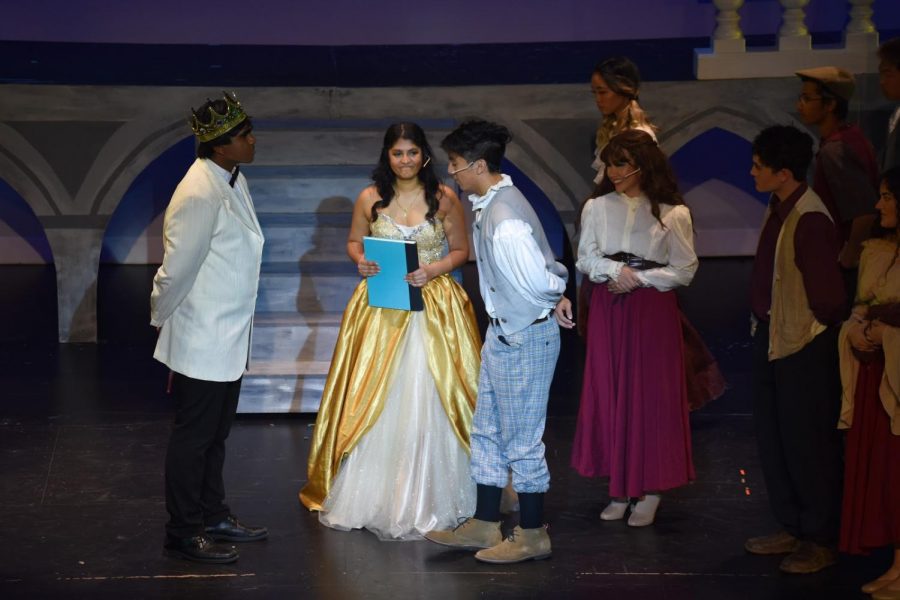How Theater Students Build a Musical
The cast of Cinderella practice their lines during after school rehearsals while sharing a fun moment. Despite the long and oftentimes stressful hours, the actors work together and stay committed to perfect their performance.
The school musical is the center of conversations among students in the spring, and creating it is no easy process. Producing a musical is a nearly yearlong development that starts immediately after the previous musical has ended, holding auditions and callbacks during October and enduring rehearsals up until opening night in March.
When teachers choose a musical, they look for a balance between a challenge and a fresh style for students, according to theater teacher Samantha Sanford. Teachers keep in mind if the music is at the right level with music teacher Desmond Steven’s orchestra and if dance numbers include skills that dance teacher Samantha Gardner has taught in her classes. Scheduling with the marching band also comes into play.
After the musical is selected, the hardest part of the process begins: auditions.
“Truthfully, all of the teachers at Portola leave any prior knowledge at the door,” Sanford said. “As far as auditions go, it really truly matters what happens the day of, in the room.”
In the first round of auditions, the criteria is mostly if students are able to hold a note while singing. Afterwards, teachers compare their notes and compile a list of students for callback auditions, where they look for students who will play lead roles. Teachers look for a higher level of skill and experience in callbacks, along with seniority.
“I know there is this stigma that it is competitive and people want to see other people fail so that they can succeed, but I have never seen that. At Cinderella auditions, at the dance auditions, I would see other people helping each other out. If someone had a question on how to do a dance move, five other people would go rush to help that person,” senior Raksha Rajeshmohan said.
After the cast list is sent out, it is time for rehearsals. Tech week is a stressful time for teachers and students due to the pressure of brushing up mistakes, getting used to quick changes, problem solving costume flaws and rehearsing long hours after school.
“Some days, we are at school for 13 hours,” senior Ian Aros said. “I have to go to school and then play sports and go straight to rehearsal. So a lot of people are just stressed out. I think that stress just shows a testament of how strong you are.”
During tech week, performers are able to have fun despite the challenges that come with rehearsals. Tech week is often when funny accidents happen both on and offstage, and the performers form close bonds.
“Let’s say rehearsal starts at three, and somebody comes in at 3:01 talking on their cell phone or eating food, and the whole cast stops and turns and looks,” Sanford said. “We all erupt into laughter … I’ve worked on shows where, in tech week, people split open their pants on stage, or for ‘Cinderella’ we were still working on fine-tuning some of the costumes and there were a lot of quick changes that had to happen in the wings. So, sometimes people would come on stage still putting their clothes on.”
When opening night finally arrives, everyone in the production does an energy circle backstage, a pre-show warmup in which everyone gives their last words of motivation.
“Mr. Rangel always says that theater is the one place where the math doesn’t add up, because in theater, it’s almost like one plus one equals three because the sum of all the parts is so much greater than what each person puts in,” Rajeshmohan said.
Your donation will support the student journalists of Portola High School. Your contribution will allow us to purchase equipment and cover our annual website hosting costs.

Haruka is a staff writer on the Portola Pilot and a part of the social media team. She is thrilled to be able to work with the Pilot to showcase the best...

Jaein Kim is the Director of Photography this year on the Portola Pilot. She is extremely passionate about visual media ranging from digital art to videography...




